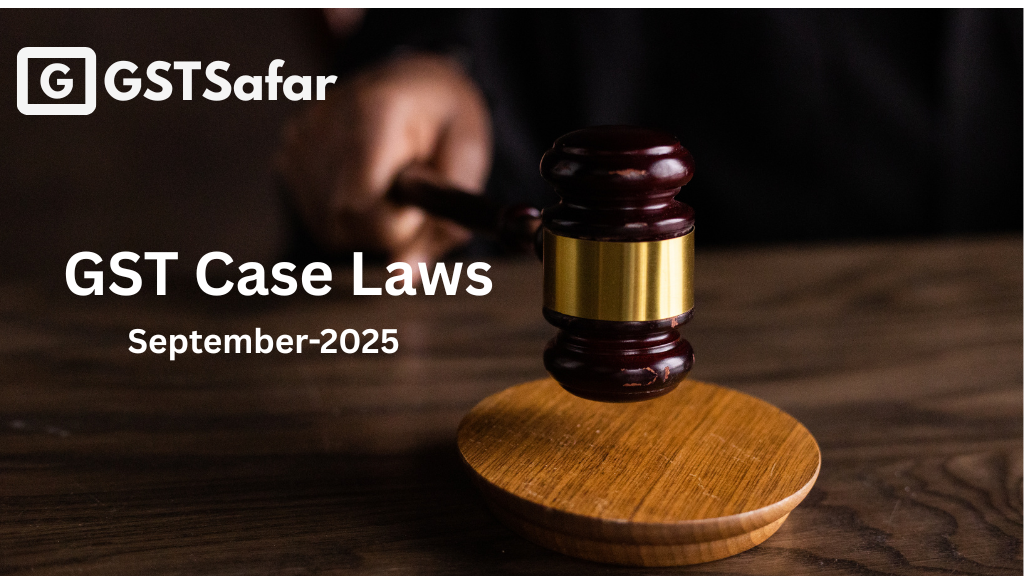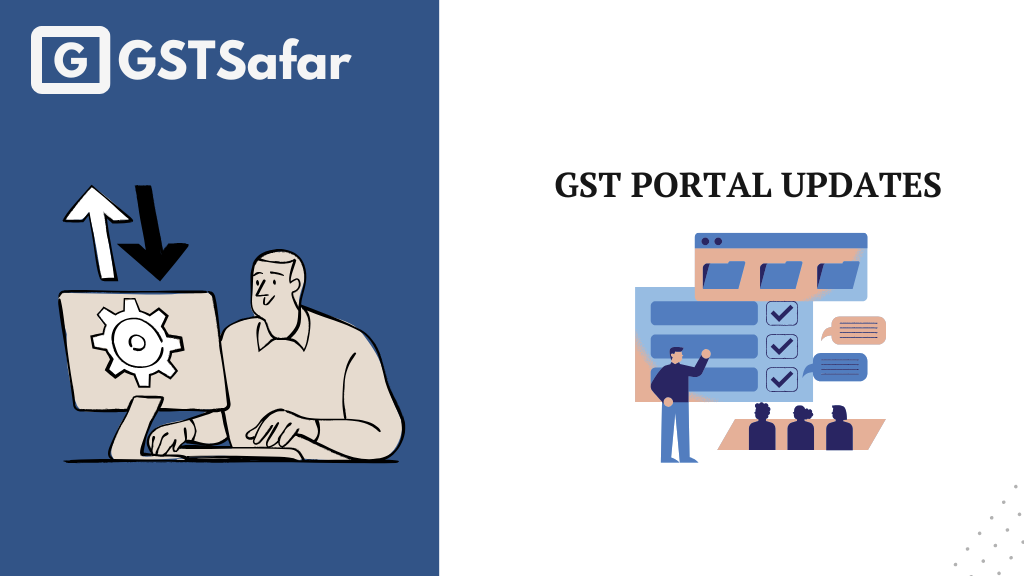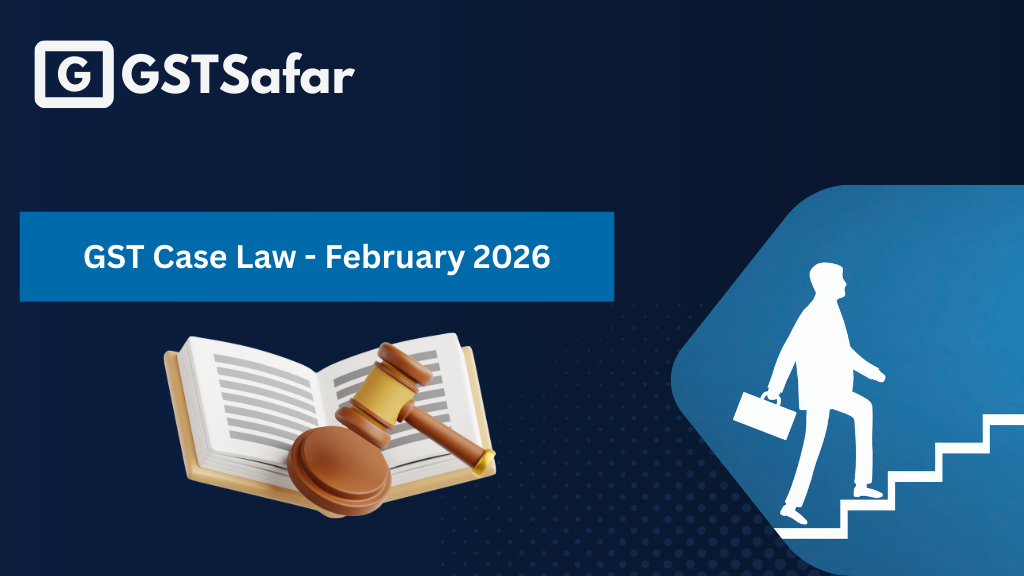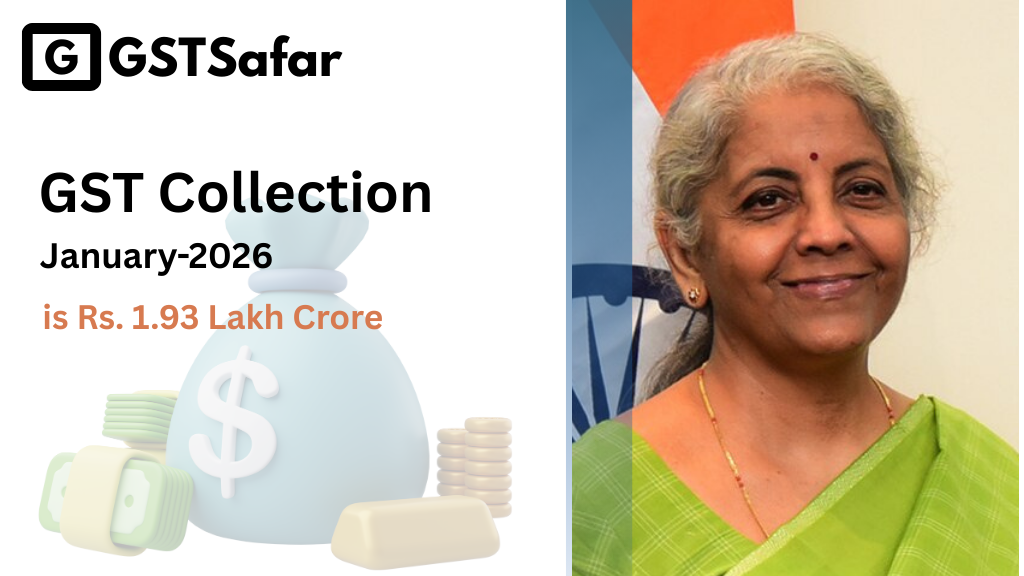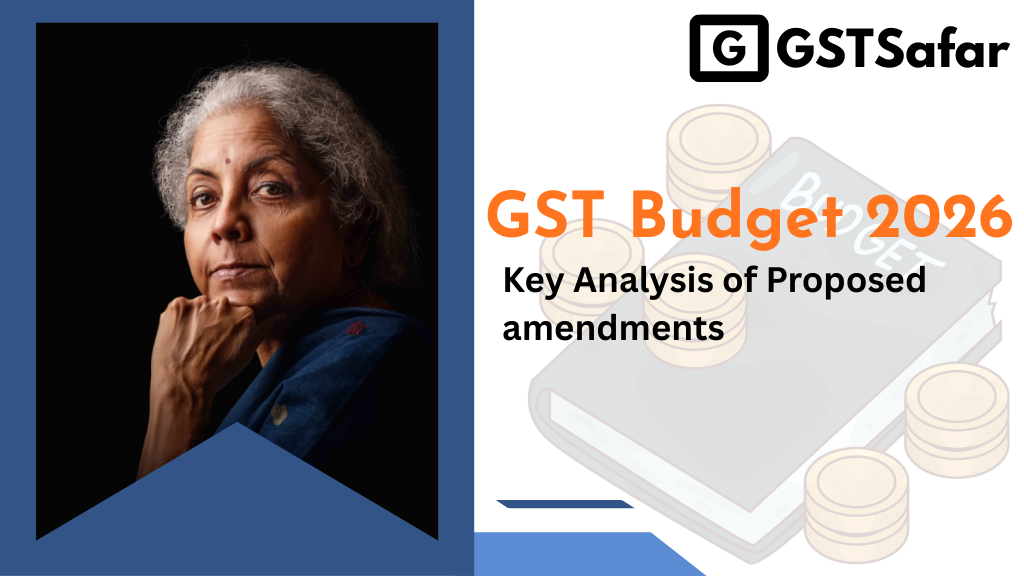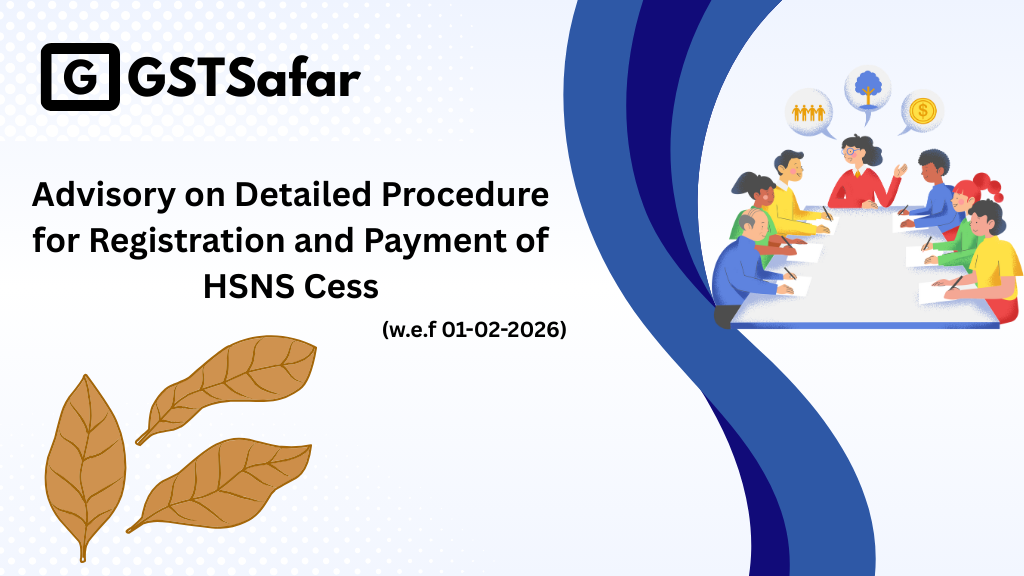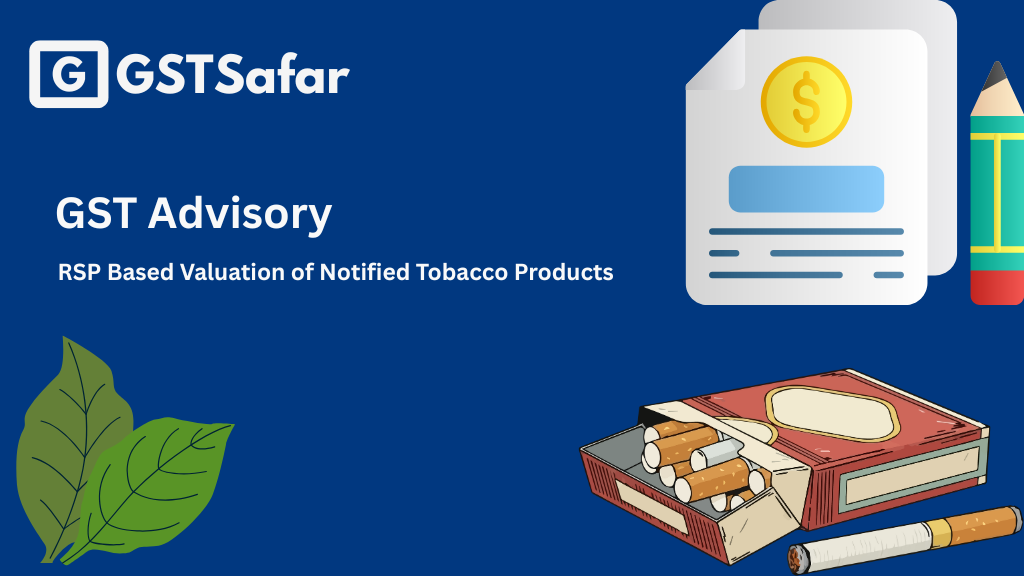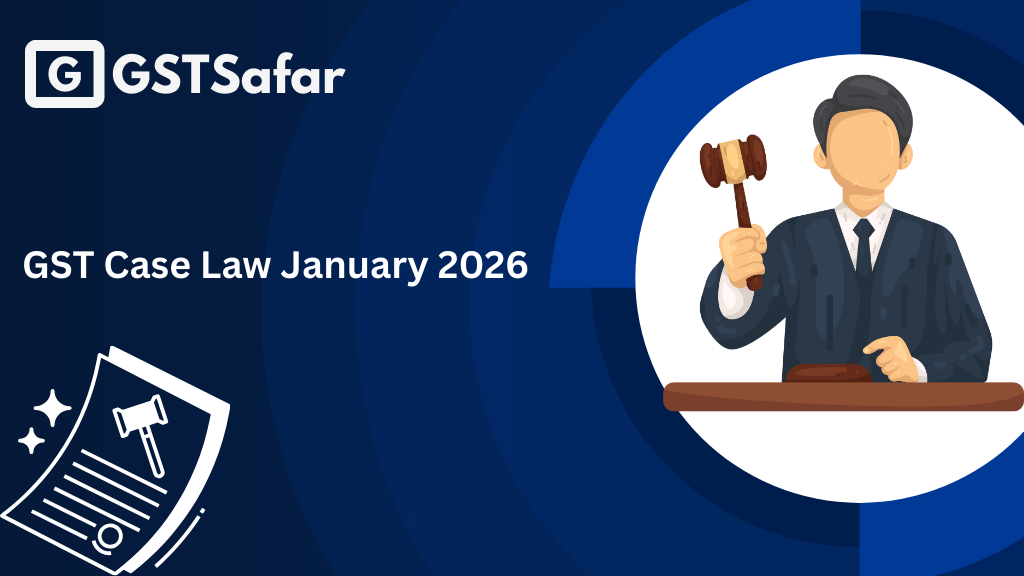GST Case Laws September 2025
The goal of this article is to cover all recent GST case laws September 2025. All latest high court judgments on gst and all the latest Supreme Court judgments on gst issued in September 2025 have been covered in this article. All the latest GST case laws of September 2025 in this article have been classified by name, date, judge, counsel, GST concept, GST section, etc. In addition, a PDF of the GST case law is provided with the case law so that the user can download it for further study.
GST Case Law on Mandatory pre-SCN scrutiny under Section 61 when discrepancy arises from returns
Gauhati High Court says n SCN under Section 73 based solely on return discrepancies is ultra vires unless the Section 61/Rule 99 scrutiny (ASMT-10 → reply → ASMT-12) is first undertaken; moreover, Table 14 of GSTR-9C was optional for FY 2017-18 to 2022-23.
| Gauhati High Court Judgement 2025 |
| Name of case: M/s Pepsico India Holdings Pvt. Ltd. v. Union of India & Ors. |
| Date of Judgment: 19-09-2025 |
| Appeal No: WP(C)/6960/2023 |
| Judges: Hon’ble Mr. Justice Soumitra Saikia |
| Counsel Name: Mr. R. Shah, Sr. Adv., with Mr. D. Borah; (Record also shows Mrs. R. Borah, Mr. D. Borah). |
Fact of the Case: Pepsico India Holdings Pvt. Ltd., registered under the CGST/AGST Acts, received a demand-cum-show cause notice (E-File No. GEXCOM/ADJN/GST/ADC/297/2023/2321-23 dated 05.09.2023) under Section 73 alleging wrongful availment and utilisation of ITC of ₹19,51,41,111 for 01.07.2017–31.03.2018, citing mismatch between GSTR-9 and reconciliation in GSTR-9C due to non-filling of Table 14. Pepsico challenged the SCN as ultra vires for two reasons: (i) the mandatory scrutiny procedure under Section 61 read with Rule 99 (issuance of FORM GST ASMT-10, consideration of reply and ASMT-12) was admittedly not followed; and (ii) Table 14 of GSTR-9C was optional for FY 2017-18 through 2022-23 per CBIC notifications, hence non-furnishing could not be treated as a “discrepancy”. It also argued limitation/SOP constraints and that proceedings could not be remanded. Revenue contended Table 14 was mandatory, relied on Circular 31/05/2018-GST and judgments, and urged alternative remedy. It cited Goverdhandham Estate to bolster the Section 61 precondition argument before 73. |
| Held by court : The Court held: when an SCN under Section 73 rests only on discrepancies from returns, the officer must first complete Section 61 scrutiny—issue ASMT-10, seek and consider reply, and, if satisfactory, close by ASMT-12. Only if no reply, or an unsatisfactory reply, can Section 73 be invoked. As no ASMT-10 was issued to Pepsico, the jurisdiction assumed under Section 73 on a mere “mismatch” was unauthorised and contrary to Chapter XII. On Table 14, the Court recorded CBIC Notifications 56/2019, 79/2020, 30/2021, 14/2022 and 38/2023 making it optional for FY 2017-18 to 2022-23; Revenue is bound by such instructions. Non-furnishing, therefore, could not be treated as a discrepancy. The objection of alternate remedy failed as the challenge was to jurisdiction. Relying on Goverdhandham Estate (Raj HC), affirmed by dismissal of SLP, the SCN dated 05.09.2023 was quashed with consequential actions set aside. Costs were not awarded by the High Court. |
| In favor of : Assessee |
| Topic of GST : Assessment/Scrutiny of Returns (ITC) |
| Section of GST: Section 61, Rule 99; Section 73(1),(2),(10); (contextually discussed: Section 75). |
Download PDF of Gauhati High Court Judgement of M/S Pepsico India Holding Pvt Limited
GST Case law on Service of Orders through GST Portal and Commencement of Limitation Period for Appeal
Madras High Court says Uploading orders on GSTN Portal alone does not amount to “communication” under Section 107; limitation period for appeal begins only when the order is duly communicated to the assessee.
| Madras High Court Judgement 2025 |
| Name of case: Sharp Tanks and Structurals Private Limited Vs The Deputy Commissioner (GST) |
| Date of Judgment: 17-09-2025 |
| Appeal No: W.P.(MD) Nos. 24684 & 24685 of 2025 |
| Judges: Mr. Justice G.R. Swaminathan |
| Counsel Name: For Petitioner – Mr. S. Jaikumar & Mr. Nitin Chopra; For Respondents – Mr. Sureshkumar, Additional Government Pleader |
Fact of the Case: A surprise inspection was carried out on the petitioner’s business premises on 10th–11th November 2022. Subsequent show cause notices were issued under Section 74 of the TNGST Act for FY 2020–21 and 2021–22. Despite filing replies and attending hearings, the authorities passed orders levying tax, interest, and penalty on 28.02.2024. The petitioner failed to file appeals within the prescribed time, claiming non-receipt of the orders since they were only uploaded on the GST portal. The petitioner approached the High Court seeking quashing of the orders and permission to file appeals beyond the limitation period. |
| Held by court : The Madras High Court held that “uploading” of an order in the GSTN portal cannot be equated with “communication” as required under Section 107 of the Act. The term “communication” implies actual receipt or knowledge of the order by the assessee, which cannot be presumed merely by portal upload. The Court directed that the limitation period would start only when the order is communicated through proper means such as registered post, email, or personal delivery. The Court further recommended systemic reforms in GSTN, including OTP-based acknowledgment and prominent dashboard notifications to ensure effective service of orders. The petitions were allowed in favour of the assessee. |
| In favor of : Assessee |
| Topic of GST : Service of Orders / Limitation for Appeal |
| Section of GST: 74, 107, 169 of the CGST/TNGST Act, 2017; Rule 142 of the TNGST Rules, 2017 |
Download PDF of Madras High Court Judgement of Sharptanks & Structurals Pvt Ltd
GST Case law on Filing of Appeal Delay – Extension of Time and Liberty to Approach Appellate Authority
Supreme Court says Liberty granted to the petitioner to file appeal within four weeks; appellate authority to decide independently on merits.
| Supreme Court Judgement 2025 |
| Name of case: M/s Krupa Jewellers V/s Assistant Commissioner of State Tax |
| Date of Judgment: 12-09-2025 |
| Appeal No: SLP (C) No. 25414/2025 |
| Judges: Hon’ble Mr. Justice Aravind Kumar and Hon’ble Mr. Justice N.V. Anjaria |
| Counsel Name: Petitioner represented by Mr. Ashutosh Dave, Adv. & team |
Fact of the Case: M/s Krupa Jewellers, engaged in the jewellery business, challenged an order passed by the Gujarat High Court in Special Civil Application No. 10122/2025, which upheld certain actions of the State Tax authorities. Dissatisfied with the High Court’s findings, the petitioner approached the Supreme Court of India through a Special Leave Petition seeking relief and reconsideration of the High Court’s decision. The petitioner raised multiple grounds, including procedural and substantive issues regarding the order passed by the authority. During the proceedings, counsel for the petitioner highlighted that the statutory limitation period for filing an appeal before the appellate authority would expire the next day (13.09.2025), and sought an extension to enable filing the appeal. |
| Held by court : The Supreme Court, after hearing the matter, declined to entertain the Special Leave Petition. However, it granted the petitioner liberty to raise all grounds before the appropriate appellate authority. The Court directed that the appellate authority, while deciding the appeal, should not be influenced by the observations of the High Court and must adjudicate independently on merits and in accordance with law. Additionally, considering the limitation period expiring imminently, the Court extended the time for filing the appeal by four weeks from the date of its order. With this, the SLP was dismissed, and pending applications were also disposed of. |
| In favor of : Assessee |
| Topic of GST : Appeal Proceedings / Limitation |
| Section of GST: .Section 107 of the CGST Act, 2017 (Appeal to Appellate Authority) |
Downlaod PDF of Supreme Court Judgement of M/s Krupa Jewellers
GST Case law on Proceedings against deceased person and liability of legal heirs under GST
Allahabad High Court says Demand cannot be raised against a dead person; legal heirs must be issued notice before determination.
| Allhabad High Court Judgement 2025 |
| Name of case: Mudit Gupta (Legal Heir to Pushpa Gupta) V/s State of U.P. and 2 Others |
| Date of Judgment: 01-09-2025 |
| Appeal No: Writ Tax No. 4277 of 2025 |
| Judges:Hon’ble Shekhar B. Saraf, J. & Hon’ble Praveen Kumar Giri, J. |
| Counsel Name: Akashi Agrawal |
Fact of the Case: The petitioner, Mudit Gupta, filed a writ petition as the legal heir of deceased Pushpa Gupta, proprietor of M/s M.G. Sarees. Pushpa Gupta passed away on 14.06.2021, and her GST registration was cancelled with effect from 14.06.2022. Despite this, the Department issued four show-cause notices between October 2023 and December 2024 under Section 73 of the GST Act for FYs 2017-18 to 2020-21, all in the name of the deceased. Since the registration was already cancelled, the notices uploaded on the portal remained unanswered. Consequently, demand orders totaling approx. ₹68 lakhs were passed in the name of the deceased. The petitioner argued that proceedings against a dead person are void ab initio. |
Held by court : The High Court observed that Section 93 of the GST Act only provides for recovery from legal heirs but does not authorize determination of liability against a deceased person. Determination can only be valid when the legal representative is issued a proper show-cause notice. Since the notices and orders were made against the dead person without involving the legal heir, the proceedings were declared void. The court quashed the impugned orders but left liberty with the department to initiate fresh proceedings in accordance with law against the legal heirs. |
| In favor of : Assessee |
| Topic of GST : Recovery / Liability of Legal Heirs |
| Section of GST: Section 73 and Section 93 of CGST Act, 2017 |
Download PDF of Allahabad High Court Judgement of Mudit Gupta
GST Case law on Outward Supplies in return
Supreme Court dismissed the SLP, holding it not a fit case for Article 136 interference.
| Supreme Court Judgement 2025 |
| Name of case: Additional Commissioner Grade-2 & Anr. V/s M/s Zhuzoor Infratech Private Limited |
| Date of Judgment: 08-09-2025 |
| Appeal No: SLP (Civil) Diary No. 44104/2025, arising out of Writ Tax No. 830/2024 (Allahabad High Court) |
| Judges: Hon’ble Mr. Justice Pankaj Mithal & Hon’ble Mr. Justice Prasanna B. Varale |
| Counsel Name: Mr. Bhakti Vardhan Singh, AOR, Ms. Arushi Singh, Adv. |
Fact of the Case: The case arose from a dispute between the GST Department (Revenue) and M/s Zhuzoor Infratech Pvt. Ltd. over issues relating to tax liability under GST. The assessee had approached the Allahabad High Court through Writ Tax No. 830/2024, challenging certain departmental actions/orders that were adverse to them. The High Court decided in favour of the assessee on 14.02.2025. Aggrieved, the Revenue preferred a Special Leave Petition (SLP) before the Supreme Court, seeking to overturn the High Court’s decision. However, there was a delay of 84 days in filing the petition, for which condonation was sought. The Supreme Court condoned the delay but examined whether the matter merited its discretionary jurisdiction under Article 136 of the Constitution. |
Held by court : The Supreme Court noted that even though the delay in filing was condoned, it was not satisfied that the matter involved any substantial question of law or exceptional circumstance warranting its interference under Article 136. The Court emphasized that its jurisdiction under Article 136 is discretionary and not meant to be invoked in every tax dispute unless there are glaring legal errors. Accordingly, the Court dismissed the SLP, thereby upholding the Allahabad High Court’s judgment in favour of the assessee. Pending applications, if any, were also disposed of. |
| In favor of : Assessee |
| Topic of GST : Writ remedy and maintainability of tax disputes under GST |
| Section of GST: Not specifically discussed (jurisdictional matter under Article 136, Constitution of India) |
GST Case law on Refund of unutilised Input Tax Credit (ITC) on closure of business
Sikkim High Court says Refund of ITC cannot be granted on closure of business as Section 54(3) restricts refunds only to specific cases, and courts cannot rewrite taxing statutes.
| Sikkim High Court Judgement 2025 |
| Name of case: Union of India & Ors V/s SICPA India Private Limited & Another |
| Date of Judgment: 05-09-2025 |
| Appeal No: W.A. No. 02 of 2025 |
| Judges: Hon’ble Chief Justice Biswanath Somadder & Hon’ble Justice Bhaskar Raj Pradhan |
| Counsel Name: Ms. Sangita Pradhan, Deputy Solicitor General of India with team for Appellants; Mr. Ankit Kanodia & Mr. Passang Tshering Bhutia for Respondents |
| Fact of the Case: SICPA India Pvt. Ltd., a manufacturer of security inks, discontinued its business operations in Sikkim due to lack of orders from RBI since January 2019. During 2019–20, it sold all machinery and claimed that ITC had been reversed as per GST law. The company applied for refund of unutilised ITC of Rs. 4.37 crores under Section 49(6), filing FORM GST RFD-01 citing closure of business. The Assistant Commissioner and Appellate Authority rejected the refund holding that closure is not covered under Section 54(3). SICPA filed a writ petition where the Single Judge allowed refund, reasoning there was no prohibition in law. The Union of India filed an appeal challenging this interpretation. |
| Held by court : The Division Bench held that Section 49(6) does not independently grant refund but requires compliance with Section 54. Refund of ITC is allowed only in two circumstances – zero-rated supplies without payment of tax or inverted duty structure. Closure of business is not covered. The Court relied on the Supreme Court’s ruling in VKC Footsteps (India) (P) Ltd. and rejected the Single Judge’s reasoning, noting it amounted to rewriting the statute. SICPA failed to provide proof of ITC reversal as per Section 29(5). Therefore, the refund claim was rightly rejected, and the writ appeal of the Union of India was allowed. |
| In favor of : Revenue |
| Topic of GST : Refund |
| Section of GST: Sections 49(6), 54(3), 29(5) of the CGST Act |
Download PDF of Sikkim High Court on Union_Of_India vs_Sicpa_India_Private_Limited
